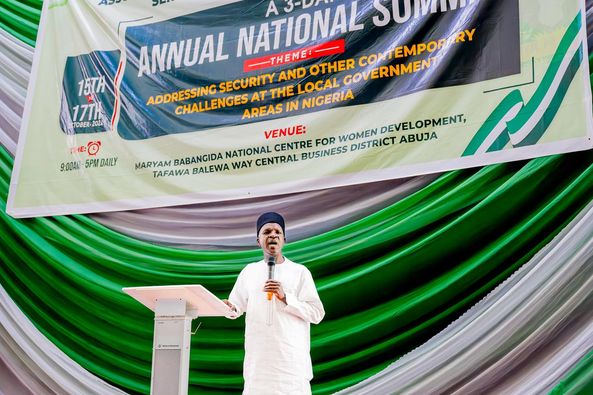The Director General of the National Information Technology Development Agency (NITDA), Kashifu Inuwa, was represented by Engr. Salisu Kaka, Director of the Digital Economy Development Department, at the National Summit organized by the National Secretariat of the Association of Local Government Service Commissions (ALGSC). The event, which took place at the Women Development Centre in Abuja, brought together key stakeholders from across Nigeria to discuss the pressing security and operational challenges confronting Local Government Councils (LGCs).
The summit, themed “Building Resilient Local Governments to Address Security and Contemporary Challenges,” sought to engage policymakers, local government administrators, and other key players in the local government ecosystem on innovative ways to tackle the growing issues of insecurity, inefficiency, and developmental roadblocks that impede the effectiveness of local governance across the country.
Engr. Kaka, in his capacity as a representative of NITDA, delivered a comprehensive paper titled “Digital Transformation: A Panacea to Digital Economy Inclusion at the Grass-Root Level.” In his presentation, Kaka emphasized the pivotal role that digital transformation can play in revolutionizing local government operations, particularly in strengthening local security mechanisms and enhancing service delivery to citizens at the grassroots level.
Digital Transformation as a Key to Local Government Resilience
Addressing the audience, Kaka underscored that digital transformation is no longer a luxury but a necessity in today’s world, especially in the public sector. He noted that integrating digital technologies into local government operations can bridge the gap between the federal government’s digital economy initiatives and the grassroots, ensuring that even the most remote local government areas (LGAs) are not left behind in Nigeria’s quest for a fully digital economy.
“Local Government Councils are the closest arm of government to the people, and they are critical to fostering inclusiveness, security, and development at the grassroots,” Kaka said. “By embracing digital transformation, we can enhance transparency, improve service delivery, and ultimately, build more resilient local governments capable of addressing the contemporary challenges they face today.”
Kaka further outlined that digital tools and platforms can serve as vital resources in the fight against insecurity at the local level. By leveraging advanced technologies such as data analytics, artificial intelligence (AI), and digital surveillance systems, local governments can better monitor and respond to security threats, thereby safeguarding their communities more effectively.
NITDA’s Commitment to Digital Economy Inclusion
Engr. Kaka reiterated NITDA’s commitment to supporting local governments in their digital transformation journey. Through various capacity-building programs, infrastructure support, and policy guidance, NITDA aims to ensure that local governments have the tools and knowledge necessary to fully participate in Nigeria’s growing digital economy.
He explained that NITDA’s mandate is closely aligned with the federal government’s broader vision of creating a fully digitized Nigeria where all citizens, irrespective of their geographical location, can benefit from the opportunities presented by the digital economy. Kaka assured the summit attendees that NITDA is ready to collaborate with local governments across the country to foster a seamless digital transformation process.
“Our goal is to ensure that no one is left behind as we transition into a digital economy. NITDA is actively working to support local governments by providing the infrastructure, training, and policy frameworks needed to integrate digital technologies into their day-to-day operations,” Kaka stated.
Stakeholder Engagement and the Way Forward
The summit also featured robust discussions and breakout sessions where stakeholders explored various challenges currently facing local government councils, including inadequate infrastructure, poor service delivery, and rising insecurity. Participants noted that while digital transformation holds immense potential for addressing these issues, a strong commitment to policy implementation and collaboration between federal, state, and local governments is essential for success.
Kaka’s presentation received widespread commendation from attendees, many of whom expressed their support for the initiative and pledged to work closely with NITDA to bring the vision of a digitally inclusive local government system to reality.
In his closing remarks, Kaka urged local government administrators to take proactive steps in adopting digital solutions, stressing that the future of effective governance at the grassroots lies in the ability to adapt to the digital age.
Conclusion
The National Summit on Local Government Service Commissions was a significant step towards addressing the multi-faceted challenges confronting local governments in Nigeria. With the focus now shifting towards digital transformation as a tool for achieving resilience, NITDA’s advocacy for digital economy inclusion at the grassroots has set the stage for further engagement between local governments and digital economy stakeholders.
As the country moves forward in its digital transformation agenda, the role of local governments will be pivotal in ensuring that the benefits of a digital economy are felt at every level of society. Through partnerships with agencies like NITDA, local governments are poised to not only improve service delivery but also contribute to national efforts to build a secure, inclusive, and economically vibrant Nigeria.




